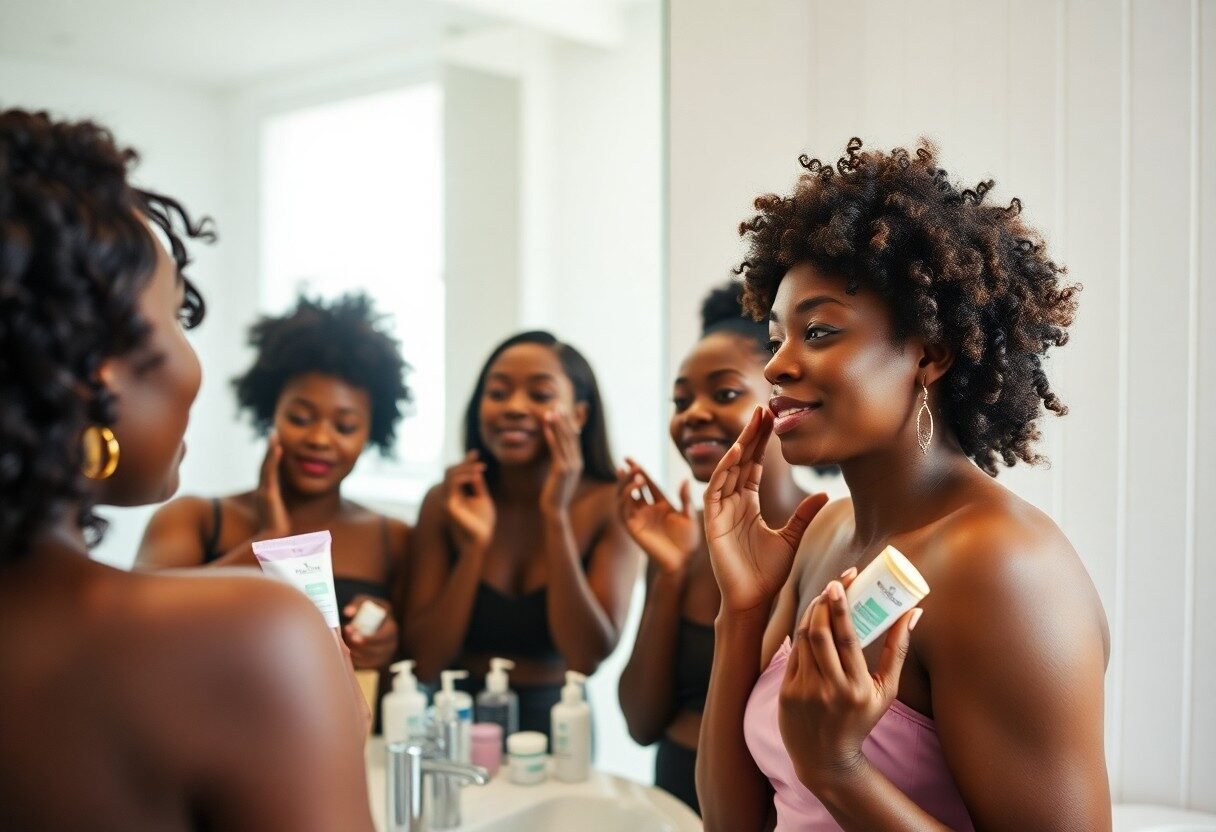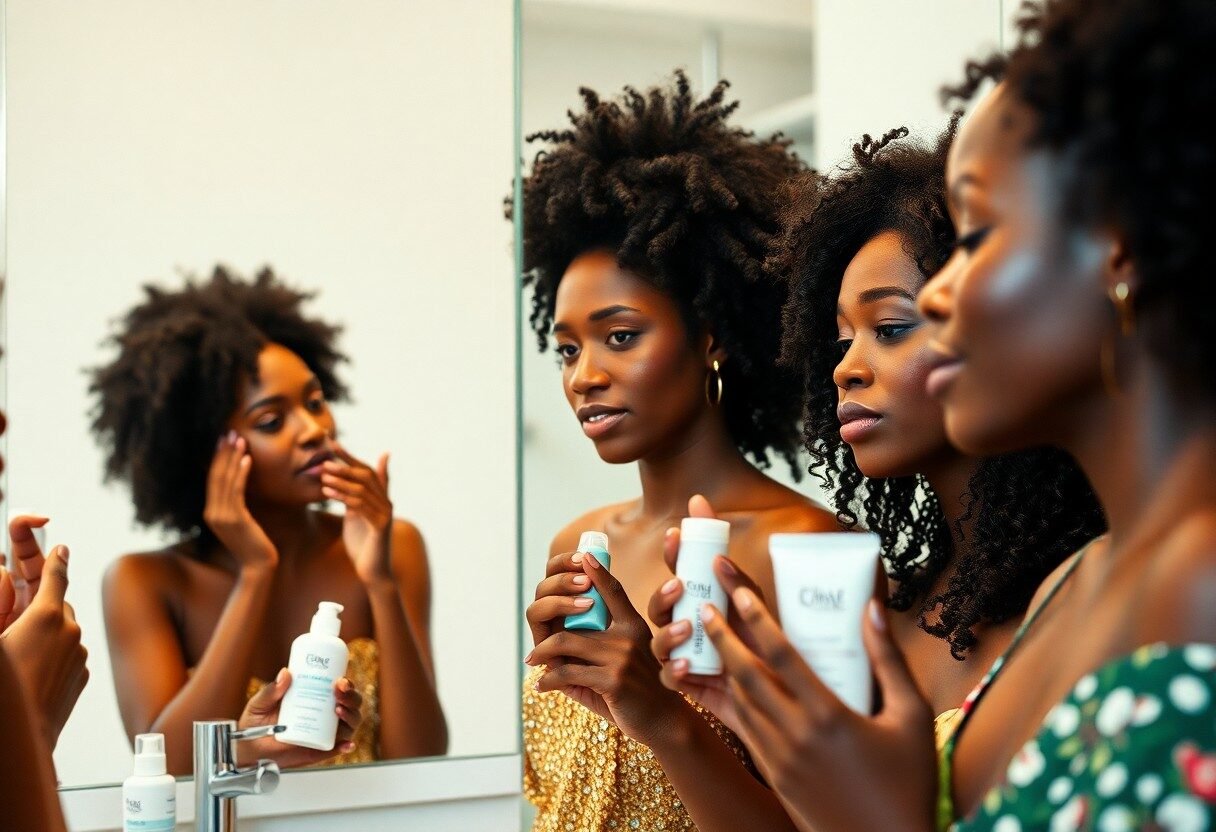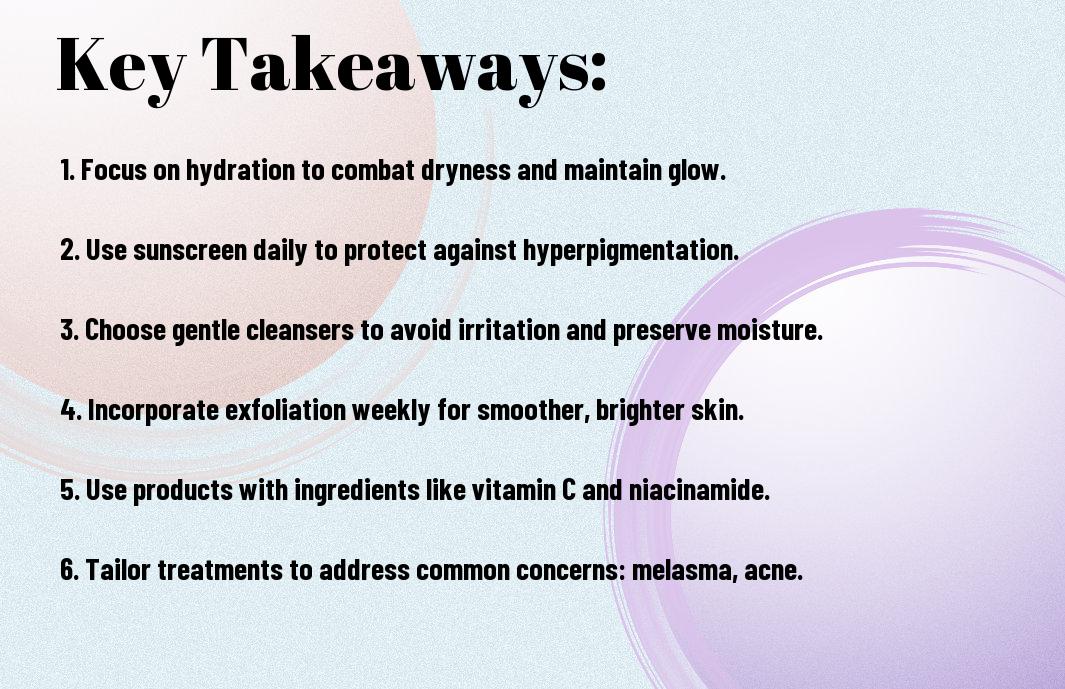
You might be wondering how to achieve that radiant and healthy skin you’ve always desired. As a black woman, your skin has unique needs that require a tailored approach. I firmly believe that incorporating hydration, protection, and careful exfoliation into your routine will significantly improve your skin’s health. In this blog post, I will guide you through a comprehensive skincare regimen designed specifically for melanin-rich skin, helping you embrace your natural beauty and enhance your glow.

Key Takeaways:
- Focus on hydration; use products that contain humectants like hyaluronic acid to maintain moisture in the skin.
- Incorporate vitamin C serums to brighten the skin and even out tone, as hyperpigmentation can be a common concern.
- Choose non-comedogenic moisturizers to avoid clogging pores, particularly for those with oily or combination skin types.
- Utilize sunscreen daily, selecting a broad-spectrum SPF 30 or higher to protect against UV rays and prevent skin damage.
- Include gentle exfoliation in your routine, using chemical exfoliants like AHAs or BHAs to promote cell turnover without irritation.
- Pay attention to ingredients; look for products that contain soothing botanicals like aloe vera or chamomile to reduce inflammation.
- Adapt your skincare regimen according to seasonal changes, as skin may require different care in winter versus summer.

The Unique Skin Challenges Faced by Black Women
Black women experience a range of unique skin challenges that necessitate tailored skincare approaches. Factors such as genetics, environmental stressors, and societal influences can contribute to specific concerns. Among the most prominent issues are skin tone variations and susceptibility to conditions like hyperpigmentation and dryness. Understanding these challenges is vital for selecting the right products and devising effective skincare routines. Knowledge of how your skin responds to different treatments can make a significant difference in achieving healthy and radiant skin.
Hyperpigmentation: Causes and Solutions
Hyperpigmentation arises from an overproduction of melanin, often triggered by inflammation, sun exposure, or hormonal changes. It manifests as dark patches that can affect skin tone and overall appearance. To combat this, consider incorporating products with ingredients like hydroquinone, retinoids, or Vitamin C, which can help lighten dark spots and promote an even complexion. Sunscreen is also important for preventing further pigmentation. Make consistent applications a priority in your regimen to achieve noticeable results.
Moisture Retention: Understanding the Spectrum of Skin Types
Maintaining moisture is paramount for all skin types, especially when it comes to addressing dryness, a common issue for many Black women. It’s important to understand that skin hydration levels can vary widely. Some may experience oily skin, while others face dry or combination types. Choosing a moisturizer that fits your specific skin type—whether it’s a lightweight gel for oily skin or a richer cream for dry patches—can make all the difference in achieving that coveted glow. Tailoring your regimen to your unique needs is key. This allows your skin to thrive.
| Skin Type | Recommended Products |
|---|---|
| Oily | Lightweight gel-based moisturizers |
| Dry | Creams with hyaluronic acid |
| Combination | Balancing lotions |
| Sensitive | Fragrance-free products |
| Normal | All-purpose moisturizers |
Understanding moisture retention begins with recognizing your skin type and its particular needs. For instance, if you possess oily skin, lightweight formulations may be best, while dry skin often benefits from heavier emollients. Combination skin requires a balanced approach, targeting both dry and oily areas effectively. Some individuals might even find that their skin type fluctuates seasonally. Using products infused with ingredients like ceramides or jojoba oil can aid in locking moisture in while preventing negative phase shifts. This tailored approach ensures your skin retains optimal hydration.
| Hydration Ingredient | Benefits |
|---|---|
| Ceramides | Strengthen skin barrier |
| Hyaluronic Acid | Holds up to 1000 times its weight in water |
| Glycerin | Draws moisture to the skin |
| Jojoba Oil | Moisturizes without clogging pores |
| Shea Butter | Locks in hydration and soothes skin |
Essential Ingredients to Look For
Choosing the right ingredients can make all the difference in your skincare routine. For Black women, focusing on hydration, nourishment, and protection is key. Ingredients like hyaluronic acid for moisture, niacinamide for brightening, and vitamin C for antioxidant protection are vital. Each of these helps to address common concerns such as hyperpigmentation, uneven skin tone, and dryness, delivering optimal results tailored to the unique characteristics of your skin.
Natural Oils: The Power of Jojoba and Marula
Natural oils like jojoba and marula are marvels for moisturizing without clogging pores. Jojoba oil mimics the skin’s natural sebum, making it ideal for balancing oil production, while marula oil is rich in antioxidants and fatty acids, providing deep hydration and improved skin elasticity. Together, they create a nourishing blend that can help maintain a radiant and healthy complexion.
Exfoliants: Balancing Chemical and Physical Options
Effective exfoliation is crucial for maintaining smooth, vibrant skin. The choice between chemical and physical exfoliants can greatly influence your skincare results. Chemical exfoliants, such as AHA and BHA, gently dissolve dead skin cells and unclog pores while improving skin texture. On the other hand, physical exfoliants scrub away dead skin and impurities. I often recommend a balanced approach, using chemical exfoliants for regular maintenance and physical options for occasional deep cleansing, ensuring that your skin remains refreshed and rejuvenated.
Finding the right combination of chemical and physical exfoliation can take time to perfect. I suggest starting with a mild AHA or BHA two to three times a week and observing how your skin responds. If you’re sensitive, you might prefer gentle scrubs made from natural ingredients like sugar or oatmeal to avoid irritation. As you experiment, focus on how your skin feels and ensure you follow up with adequate hydration and sun protection to maintain your skin’s health.
Crafting a Daily Skincare Routine
Creating a daily skincare regimen tailored to your unique needs can make a world of difference. Start by identifying your skin type—be it oily, dry, or combination. Each product you choose should align with your skin’s requirements, ensuring nourishment and protection throughout the day. Consistency is key; incorporating a structured routine will help maintain your skin’s health and radiance.
Morning Essentials: Protection and Hydration
Your morning routine is all about protection and hydration. Begin with a gentle cleanser to refresh your skin, followed by a hydrating toner to balance your pH levels. Next, apply a serum rich in antioxidants for added defense against free radicals. Always finish with a broad-spectrum sunscreen to shield your skin from harmful UV rays, especially for darker skin tones that still require SPF.
Evening Rituals: Repairing and Restoring
Evening rituals focus on repairing and restoring your skin after a long day. Start by cleansing away impurities with a deep cleanser that helps prevent breakouts and congestion. Incorporating a nightly serum containing hyaluronic acid or retinol can significantly enhance your skin’s texture and tone. Don’t skip out on a nourishing moisturizer, ensuring hydration and promoting cellular renewal overnight.
A well-structured nightly routine not only prepares your skin for the next day but also takes advantage of your body’s natural healing processes. While you sleep, your skin regenerates, making this an optimal time for active ingredients in treatments. Mobile facial brushes can aid in better absorption and improved circulation. This thoughtful ritual helps combat common concerns such as dullness, uneven skin tone, and signs of aging. Prioritizing this step can effectively boost your skin’s overall resilience and appearance, leaving it soft and glowing by morning.
The Role of Professional Treatments in Skincare
Professional treatments can greatly enhance your skincare routine, offering more potent solutions for specific concerns. Services like chemical peels, microdermabrasion, and laser therapy tackle issues unique to Black skin, such as hyperpigmentation, cystic acne, or uneven texture. Regular visits to a licensed esthetician or dermatologist not only provide tailored treatments but also help you stay informed about the best products for your skin type. These professionals have the expertise to determine what works best for you and can guide you in optimizing your home regimen.
When to See a Dermatologist
Consult a dermatologist if you experience persistent breakouts, acne scarring, or changes in skin texture or color that don’t respond to over-the-counter products. Additionally, issues like excessive dryness, eczema, or unusual skin lesions warrant professional evaluation. Seeking help early can prevent complications and ensure you receive the most effective treatment tailored for your skin type.
The Benefits of Customized Skincare Regimens
Customized skincare regimens cater to personal needs, addressing specific skin concerns such as dark spots, dryness, or sensitivity. A tailored approach often results in improved effectiveness, as products are selected for your unique skin type and lifestyle. I’ve found that working with a professional allows for adjustments based on how my skin responds, leading to healthier and more radiant skin.
In my experience, the true value of customized skincare lies in the precision it offers. For example, a friend faced persistent acne and an uneven complexion; after consulting a dermatologist, she received a regimen that combined prescription treatments with hydrating products specifically suited for her skin type. Not only did she see a marked improvement in her skin, but she also learned which ingredients to avoid. This personalized approach empowers you to embrace your unique beauty while addressing individual challenges effectively, transforming your skincare journey into a successful and fulfilling experience.
Empowering Your Skincare Choices
Taking control of your skincare journey is about more than just products—it’s about understanding your individual needs and preferences. I encourage you to explore ingredients and formulations that resonate with your skin type while celebrating its unique qualities. Personal empowerment comes from knowledge; don’t hesitate to ask questions, read labels, and consider how different options can benefit your skin. I believe every choice you make should align with your lifestyle and values, allowing you to cultivate a routine that not only enhances your appearance but also uplifts your confidence.
Breaking the Stigma: Embracing Diverse Beauty Standards
In a world often saturated with narrow beauty ideals, embracing diversity in beauty allows you to celebrate your individuality. I find strength in the complexity of Black beauty, which encompasses a spectrum of skin tones, textures, and features. Recognizing that there’s no one-size-fits-all when it comes to beauty standards fosters self-acceptance and pride. Use your voice and presence to challenge stereotypes and advocate for an inclusive definition of beauty that embraces all forms, reflecting the richness of our identities.
The Importance of Community Knowledge and Resources
Building a skincare regimen becomes significantly more effective when I collaborate with my community. Sharing experiences and resources with friends, family, and online forums can provide insights that are otherwise difficult to access. Local beauty events and wellness workshops amplify this connection, enabling us to discover products and practices that our peers have found beneficial. Whether it’s learning about a new layering technique or the best natural remedies, the collective wisdom strengthens our confidence and ensures we’re not navigating our skincare journeys alone.
Community plays a pivotal role in skincare education and empowerment. I often turn to social media platforms where Black influencers share their routines and experiences, creating a rich tapestry of knowledge that is readily accessible. Engaging with others who understand the unique challenges posed by diverse skin types opens up opportunities to learn about personalized products and treatments. Participating in local workshops and events strengthens this network, providing hands-on experiences and recommendations geared toward our specific needs. By pooling our insights and resources, I find not only confidence in my choices but also a sense of belonging within a shared journey toward healthier, radiant skin.
Summing Up
Presently, I’ve learned that the perfect skincare regimen for Black women focuses on understanding your unique skin type and addressing its specific needs. You should incorporate hydrating cleansers and moisturizers, along with targeted treatments for hyperpigmentation and uneven skin tone. Regular exfoliation and sun protection are also key to achieving radiant skin. By embracing a tailored approach, you can enhance your natural beauty and ensure your skin remains healthy and vibrant.
FAQ
Q: What should be the first step in a skincare regimen for Black women?
A: The first step should be cleansing the skin. It’s important to use a gentle cleanser that removes dirt, makeup, and impurities without stripping natural oils. Look for a sulfate-free formula to avoid irritating sensitive skin.
Q: How can I address hyperpigmentation in my skincare routine?
A: To tackle hyperpigmentation, incorporate products with ingredients like vitamin C, niacinamide, and hydroquinone. These can help brighten dark spots and even out skin tone. Additionally, using sunscreen daily is vital to prevent further darkening of hyperpigmented areas.
Q: What type of moisturizer is recommended for Black women’s skin?
A: A rich, hydrating moisturizer is advisable, especially for those with dry or combination skin. Look for products that contain ingredients like shea butter, jojoba oil, or hyaluronic acid to provide lasting hydration without clogging pores.
Q: How often should I exfoliate my skin?
A: Exfoliation should be done 1-2 times a week, depending on your skin type. For sensitive skin, opt for a gentle chemical exfoliant like AHAs or BHAs. Exfoliating helps to remove dead skin cells and can improve skin texture and radiance.
Q: Is sunscreen necessary for Black women’s skin?
A: Yes, sunscreen is vital for all skin types, including darker skin tones. Many people think that darker skin does not require sunscreen, but UV rays can still cause damage and contribute to aging and hyperpigmentation. A broad-spectrum SPF of 30 or higher is recommended.
Q: How can I keep my skin hydrated in dry climates?
A: In dry climates, it’s important to apply moisturizer immediately after cleansing while the skin is still slightly damp. Utilize a humidifier indoors to help maintain moisture in the air. Additionally, using a serum or oil that locks in moisture can provide extra hydration.
Q: What ingredients should I avoid in skincare products?
A: It is advisable to avoid products with alcohol, sulfates, and fragrances, as they can irritate or dry out the skin. Additionally, steer clear of harsh exfoliants that can lead to sensitivity and aggravation of issues like eczema or acne.











